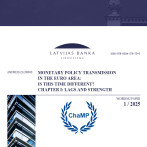The Amount of Currency in Circulation Strongly up in December
In December 2009, the amount of currency in circulation continued to increase, with the monetary aggregate M3 growing by 3.9%. Along with substantial easing of uncertainty about the future economic growth due to the approval of the 2010 state budget, monetary aggregates were positively affected also by seasonal factors, e.g. government expenditure traditionally rising at the close of the year, attractive interest rate offers (the average weighted interest rate on household time deposits amounted to 11.4% in December), etc. The holiday season was a driver behind the boost (4.3%) in the demand for cash.
The growth of 4.6% in domestic deposits, with those in lats building up substantially and their counterparts in euro moderately, had a major increasing effect on the amount of currency in circulation. Household and corporate deposits grew at a similar pace, by 4.5% and 4.7% respectively. Within the month, an even stronger boost was recorded for bank non-resident deposits (+7.6%). The rise in domestic deposits reached a high of the last two years in December; as a result, the annual rate of deposit growth for the first time since October 2008 again turned positive (+1.7%).
In December, the contraction in private sector lending continued (-1.5%) and was indicative of prudent bank stances toward lending in the context of deteriorating quality of loan portfolios and low domestic demand. As to lending, commercial credit to businesses shrank, with loans for house purchase and consumer credit to households at the same time declining moderately. Industrial loan portfolio, nevertheless, remained stable suggesting that the financing for business development was affected to a lesser extent.
If the government uses the received foreign funding gradually and effectively to finance the budget expenditure, the amount of currency in circulation is expected to grow also in the current year provided that the ongoing reforms are successfully implemented and the 2011 state budget process timely started. In the meantime, lending is likely to be spurred by export-producing sectors whose recovery had already started by the close of the last year.
Textual error
«… …»






